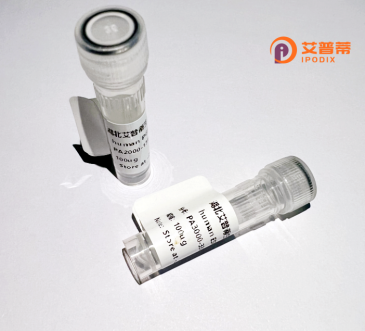
| 纯度 | >90%SDS-PAGE. |
| 种属 | Human |
| 靶点 | PTOV1 |
| Uniprot No | Q86YD1 |
| 内毒素 | < 0.01EU/μg |
| 表达宿主 | E.coli |
| 表达区间 | 1-416 aa |
| 活性数据 | MVRPRRAPYR SGAGGPLGGR GRPPRPLVVR AVRSRSWPAS PRGPQPPRIR ARSAPPMEGA RVFGALGPIG PSSPGLTLGG LAVSEHRLSN KLLAWSGVLE WQEKRRPYSD STAKLKRTLP CQAYVNQGEN LETDQWPQKL IMQLIPQQLL TTLGPLFRNS QLAQFHFTNR DCDSLKGLCR IMGNGFAGCM LFPHISPCEV RVLMLLYSSK KKIFMGLIPY DQSGFVSAIR QVITTRKQAV GPGGVNSGPV QIVNNKFLAW SGVMEWQEPR PEPNSRSKRW LPSHVYVNQG EILRTEQWPR KLYMQLIPQQ LLTTLVPLFR NSRLVQFHFT KDLETLKSLC RIMDNGFAGC VHFSYKASCE IRVLMLLYSS EKKIFIGLIP HDQGNFVNGI RRVIANQQQV LQRNLEQEQQ QRGMGG |
| 分子量 | 46.8 kDa |
| 蛋白标签 | His tag N-Terminus |
| 缓冲液 | PBS, pH7.4, containing 0.01% SKL, 1mM DTT, 5% Trehalose and Proclin300. |
| 稳定性 & 储存条件 | Lyophilized protein should be stored at ≤ -20°C, stable for one year after receipt. Reconstituted protein solution can be stored at 2-8°C for 2-7 days. Aliquots of reconstituted samples are stable at ≤ -20°C for 3 months. |
| 复溶 | Always centrifuge tubes before opening.Do not mix by vortex or pipetting. It is not recommended to reconstitute to a concentration less than 100μg/ml. Dissolve the lyophilized protein in distilled water. Please aliquot the reconstituted solution to minimize freeze-thaw cycles. |
以下是关于重组人PTOV1蛋白的3篇参考文献示例(基于公开信息概括,具体文献需自行检索验证):
---
1. **文献名称**:*PTOV1 promotes tumor progression by regulating the Akt signaling pathway in prostate cancer*
**作者**:Santamaría A, et al.
**摘要**:研究发现PTOV1在前列腺癌中高表达,并证实其通过激活Akt信号通路促进肿瘤细胞增殖与侵袭。重组人PTOV1蛋白的体外功能实验显示其对肿瘤生长的调控作用。
2. **文献名称**:*The role of PTOV1 as a modulator of androgen receptor signaling in breast cancer*
**作者**:Benedit P, et al.
**摘要**:文章揭示PTOV1通过重组蛋白技术被纯化后,证实其能与雄激素受体(AR)互作,增强AR的转录活性,促进乳腺癌细胞的激素依赖性生长。
3. **文献名称**:*PTOV1 interacts with MYC to stabilize its protein and promote colorectal cancer metastasis*
**作者**:Wang Y, et al.
**摘要**:通过重组PTOV1蛋白与MYC的共表达实验,作者发现PTOV1抑制MYC的泛素化降解,进而促进结直肠癌转移,为靶向干预提供潜在策略。
---
如需具体文献链接或最新研究,建议通过PubMed(https://pubmed.ncbi.nlm.nih.gov)或Google Scholar检索关键词“recombinant PTOV1 protein”或“PTOV1 function”。
Prostate tumor overexpressed 1 (PTOV1) is a chromatin-associated protein initially identified as overexpressed in prostate cancer. It is involved in diverse cellular processes, including cell proliferation, transcriptional regulation, and tumor progression. Structurally, PTOV1 contains conserved domains, such as the N-terminal PTOV repeat and C-terminal hydrophobic regions, which mediate protein-protein interactions and chromatin binding. It interacts with transcriptional complexes, influencing the expression of genes linked to oncogenesis, including those in the Hedgehog and Akt/mTOR pathways. Studies suggest that PTOV1 promotes cancer cell invasiveness, metastasis, and therapy resistance by modulating DNA repair, cell cycle progression, and epithelial-mesenchymal transition.
Recombinant human PTOV1 protein, produced via bacterial or mammalian expression systems, serves as a tool for studying its molecular mechanisms. Its overexpression correlates with poor prognosis in prostate, breast, and colorectal cancers, highlighting its potential as a diagnostic biomarker or therapeutic target. Recent research also implicates PTOV1 in non-cancer contexts, such as stem cell regulation and immune responses. However, its precise molecular functions and regulatory networks remain partially understood, warranting further investigation to elucidate its role in health and disease.
×